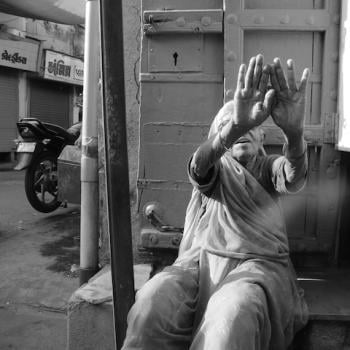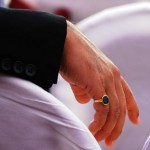Growing up fundamentalist, I heard endless tirades about the importance of having a set of heterosexual parents. My mother was to be my example of submission, selflessness and homemaking. My father was to be my protector, modeling the role of my future husband. I’ll say more about some of the problems with this model in a future post.
I was taught that children needed both a feminine and a masculine parental figure, that the traits of each would “balance” us somehow (even though I was expected to grow up 100% feminine). The worst possible sin against one’s children was to entertain the thought of divorcing one’s spouse.
When I was 13, my parents divorced. It was awesome.
I’m not kidding. You know why? Here’s what preceded the divorce: My father being absentee for the first few years of my life. He actually slept in the car to avoid my cries as a baby at night. Then, when I hit puberty, he decided to get involved. This meant a series of endless lectures about how boys were faithless lechers and would abandon me, pregnant, in the middle of a parking lot, if I so much as held their hands. He also began to point out anything I was wearing that made me look “busty” or “developed,” which made me want to crawl under a rock and saw off my breasts with a kitchen knife.
His demeanor was rigid and authoritarian, then excessively affectionate. This meant that I never knew whether confiding him would result in a cold rebuke or a hug. He once shoved me off his lap and said, “Go away, little girl, you’re bothering me.” I thought he was joking, so I climbed back up. He shoved me away, hard. I was eight years old. My father also modeled the selfishness and lechery he told me were inherent in all men. He ridiculed my mother for her small breasts and once mistakenly picked up one of my bras from the laundry pile and made fun of it, thinking it was hers. He leered at every woman in high heels who crossed our path in public. His office was plastered with pornography. He verbally abused my mother for refusing to cut her hair or wear makeup, telling her that it was her duty as a wife to be sexy for him when he wanted it. It turns out that he really wanted to be able to show her off to other men. He told my mother and me that he was humiliated to take us to the beach in our church garb (I was humiliated to wear the church garb, but shaming us only reinforced our convictions that we should). He grew jealous of my mother’s commitment to her church, and insisted that she have dinner on the table for him at 6:00 every night, which meant no going to evening church services. To save my mother the indignity of being commanded, “Coffee, woman,” I began filling the coffeepot and plugging it in before the meal started. My strategy only got “Coffee, daughter,” addressed to me. He would stand over me, micromanaging the dishes I washed, though he never himself scrubbed a dish at all, or even pushed in his chair.
Before the divorce, my father began gaslighting my mother, telling her that she was stupid and incompetent and that he was doing her a favor by staying with her. Broken down under the weight of her marriage, my mother began to frantically confess all of her sins – including an ancient sin she believed she’d committed against him in the early years of their marriage. She asked his forgiveness. He slapped her across the face. He blamed her for ruining her life. I heard this, and wanted to beg God to kill him already and spare us. But I knew that was wrong, so I didn’t. Instead, I wrote him one of fifteen angry letters disowning him as a parent, and then burned it in the bathroom sink.
Then, to spite her, he took a mistress. This mistress was literally a prostitute, with a daughter my age. He would stay up all night, using the computer in my bedroom to chat with her online. In frustration, I (then 12) emailed her the message “LEAVE MY DAD ALONE.” I was promptly punished and harangued for not “thinking about others’ feelings.” He moved in with her before the divorce went through, and promptly spent all his money buying things for her and her daughter that we had never had. I was glad to be rid of him, but he still showed up once a week to demand one-on-one time with me.
Then there were the little isolated incidents. Once, he told me that he had the right to inspect my naked body anytime to “observe my development.” I told him he had no such right without my permission, and he responded that, as his daughter, I belonged to him and he could do what he liked with me. Nothing further came of it, but I felt constantly insecure afterwards and began locking my door when I went to sleep.
And there was the temper. He could be reduced to screaming rage, object-breaking and vicious belittling without any provocation. I once had to literally beg him, sobbing on my knees, not to hit me after I disobeyed him. He only hit me once, but I knew his potential. He collected guns and knives, and I had a vivid imagination.
The divorce came from him. My mother didn’t accept it, since nothing could undo wedding vows once spoken. She did not, however, contest it legally. There was no property dispute, because by this time we had already had to sell everything to stay alive. His income was being poured into the pockets of his mistress. In short order, we lost our house and all the things in it. We had to give away our dog and move into the basement of my mother’s parents. My mother was devastated and shamed. I was weathered but grateful that at least we didn’t have to live with him anymore.
Both of us fell into a deep depression, having washed up where my mother began her life, isolated from our friends by a two-hour drive and bereft of an income (because my mother had stayed at home to homeschool me). I socialized exactly once a week, and worked the rest of it.
A few months after the dust settled, my pastor made the Second Stupidest Comment to Ever Be Made to Me. It was this:
“Sierra is depressed because she needs her father. She is vulnerable without the head of the household to ward off evil spirits. She has no one to protect her from ungodly boys. She won’t admit it, but deep down she misses him. You must pray that he will return to you.”
This comment was made within earshot, and I could not let it stand. I marched up to my pastor and my mother and declared, “No, actually I don’t miss him at all. I hated him. His leaving was the best thing that ever happened to me.” They stared at me, aghast, then laughed and called me a delusional child. I gave up and walked away. I was 15.
The mindset that divorce is the worst thing that can happen to a child is idiotic. Divorce was the best thing my father ever did for me (although he later recanted and moved back in with us, to my dismay). Living without him for a few years was a haven of tranquility that I never knew in his presence. In the worst of our circumstances, with family blaming us for our “weird religion” and how it drove away my father, I was just glad to know that I could go about my business without avoiding, serving or placating him.
The absence of a father was my most treasured possession in those empty years. Not being subject to his control and his temper, not listening to him belittle my mother and criticize her every feature, not fearing a physical assault, not feeling obliged to pay some sort of Biblical respect and obedience to a man I despised – that was my prize. I loved his absence more than I could possibly have loved the man himself. His absence allowed me to gain confidence I had never had.
In some ways, I’m grateful for my father’s failures. They allowed me to instinctively recognize the culture of purity balls and pledges for what it is: lace-trimmed patriarchal incest. The thought of my father literally controlling my sexuality, of his being the one to decide what men were worthy of me, made my skin crawl. I wanted a good man to help me get away from him – which would have been impossible if he were “guiding” my “courtship.”
My father’s blatant claim that I was his property, and most importantly my church’s failure to veto that claim, told me all I needed to know about my status in fundamentalist Christianity. I insisted that my body was mine. They taught me that it was my father’s until I was married, and then it was my husband’s. Literally, ownership. I learned that a wife could never refuse sex with her husband, or deny him the number of children he wanted. “Your father has no right to make you sin,” they said, trying to reassure me. As if that was any comfort! I didn’t want to sin. I wanted to be free. My body was mine; I lived in it, not he. But that didn’t matter to anyone at my church.
I’ll undoubtedly get some comments saying that divorce is certainly acceptable in my situation, because obviously my father’s behavior was abusive. The thing is, my church made no allowance for divorce because of abuse. The only acceptable divorce was a man divorcing a woman for infidelity. A woman could not divorce her husband, ever, for any reason. Do, please, explain to me the sense in pairing this lunacy with the courtship model and expecting to get good results. Marrying a woman to a man she hardly knows, vetted by her father no matter what his character, and divesting her of the option to leave if the worst happens, is a despicable, misogynistic prison built by merciless men with “Jesus” on their lips.
Divorce is not what breaks a family. It is only the seal placed on a family that has broken itself. Sometimes, the children need divorce to protect them. They are being broken by one of their parents, or both of the parents together. “God hates divorce,” the fundamentalists parrot to each other.
Really. I ask you, how do you in good conscience worship a God who prefers the upholding of an external ideal (“marriage”) over the health and mental soundness of the children that union produced? You who counsel women to stay in abusive marriages because her children “need a father,” you might as well drop all pretenses and slit the child’s throat on an altar to the idol you call Marriage. You who uphold marriage as an inflexible Law – what would you have done with Jesus?
Divorce did not make me angry, helpless, depressed and scared. My father did those things. Divorce did not make me leave the church. The church did that. Divorce has never, ever hurt me. Indeed, it was welcome. A blessing.
Divorce, for a little while, was my salvation.














